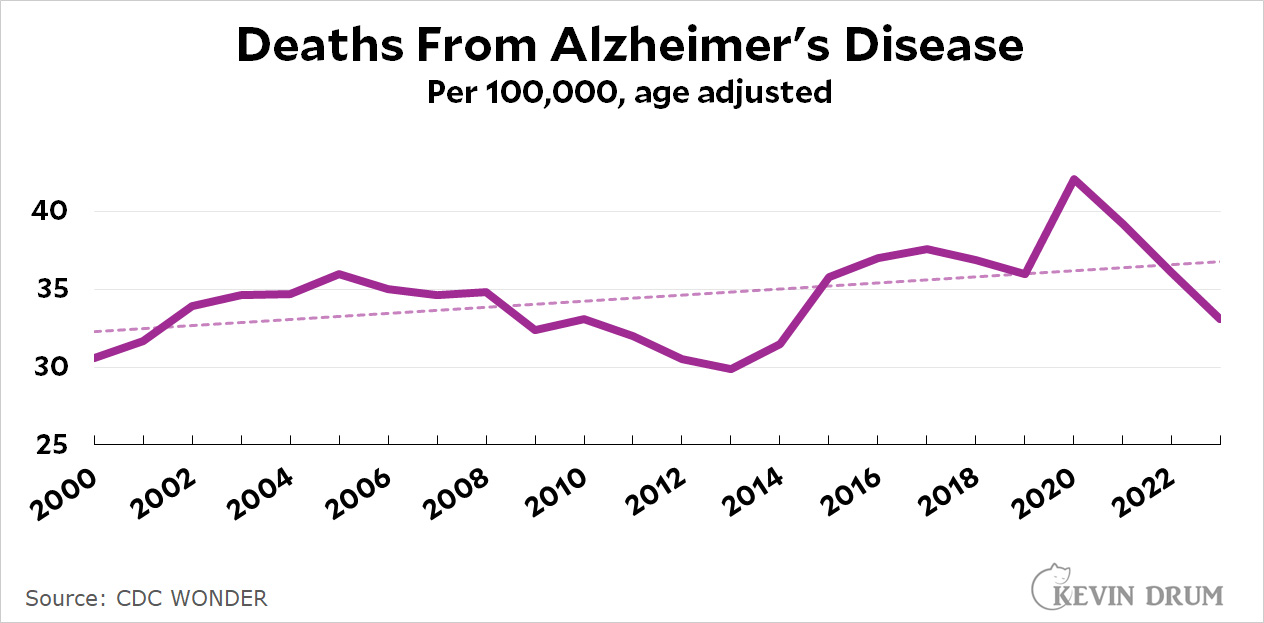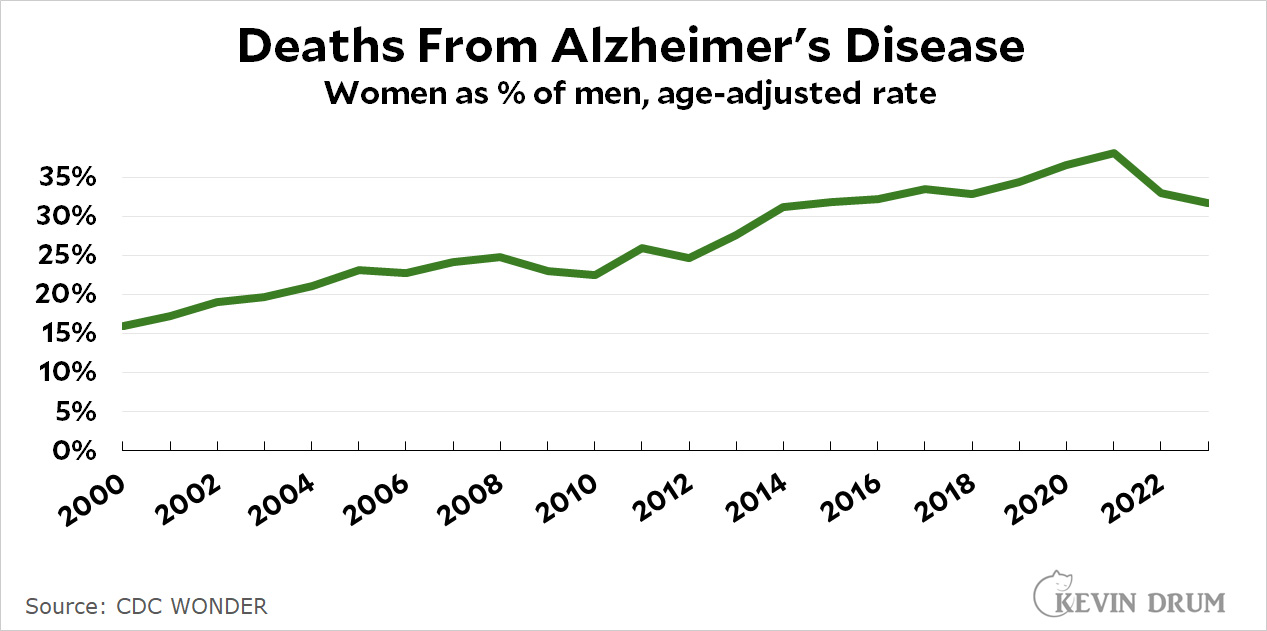Every once in a while, when I'm bored, I'll pull up some big information source and just browse randomly to see if I find anything interesting. I was doing this a couple of nights ago and came up with this:
 The death rate from Alzheimer's disease has increased about 10% since 2000. This is age-adjusted, so it's not due to the aging of the population. In any event, this isn't what was interesting.
The death rate from Alzheimer's disease has increased about 10% since 2000. This is age-adjusted, so it's not due to the aging of the population. In any event, this isn't what was interesting.
It's always been the case that women get Alzheimer's at higher rates than men. No one knows for sure why, but the best guess at the moment is that women have better immune systems than men, which produces more amyloid plaque in the brain. This in turn produces higher rates of Alzheimer's. However, this is also not what was interesting.
What's interesting is that the increase in Alzheimer's deaths is due entirely to women. The death rate among men is exactly the same as it was in 2000 while the death rate among women has increased significantly:
 In 2000, women died from Alzheimer's at a rate about 15% higher than men. Today, it's about 30% higher. This is age-adjusted data, so it's not because women live longer. You get roughly the same results if you plot the death rate for a single specific age (like, say, the death rate at age 75).
In 2000, women died from Alzheimer's at a rate about 15% higher than men. Today, it's about 30% higher. This is age-adjusted data, so it's not because women live longer. You get roughly the same results if you plot the death rate for a single specific age (like, say, the death rate at age 75).
This is mysterious. Women are dying from Alzheimer's at a much higher rate than men, and the gap is getting bigger over time.
Why?

Better diagnosis? Better diagnosis of unpartnered people, who are much more likely to be women who outlived husbands than men who outlived wives?
Could be as simple as deaths from another source have gone down. If deaths due to heart disease, diabetes, or cancer decline, deaths due to other causes go up.
This is my thought also. Maybe we've gotten better at treating these other things, so even though the rate in the chart is age-adjusted, maybe people are living longer because they're not dying at earlier ages from CKD, heart failure, etc. - and so are more likely to die from Alzheimer's later.
Makes sense. Alzheimer is almost the default disease.
I know this is just anecdotal, but I've known lots of people who managed to live well into their nineties without developing Alzheimer's or any other form of dementia. I don't believe dementia is inevitable.
Alzheimer's is very much a "if something else doesn't get you first" cause of death. Cancer in particular is getting less lethal, I'm guessing we have a whole bunch of people dying of Alzheimer's who would have died of cancer if they'd been born a decade or two earlier.
I'm not sure I grasp the subtleties of this question. If a person does not succumb to other causes before the advanced stages of Alzheimer's disease, the disease itself will ultimately lead to death in 100% of cases. Is that not so?
Perhaps men diagnosed with Alzheimer's Disease are dying from non-Alzheimer's causes at a higher frequency than women?
I also had this thought (in addition to my above reply). Are men dying earlier? Hasn't male life expectancy gone down? Therefore the % of men dying from Alzheimer's (as opposed to other causes) would be lower, no? Which would mean the women dying from Alzheimer's as a % of men would be going up.
That said, I looked this up as best I could in just a couple of minutes and it would appear that if male life expectancy did decline relative to female life expectancy it was small and therefore can not explain the entirety of this chart. In fact, it makes this chart a little more confusing because for most of the first portion of this chart, male life expectancy was closing the gap with female life expectancy (meaning more men should be dying from Alzheimer's during that time period), which makes the increase in women as % of men that much more eyebrow-raising.
https://www.cdc.gov/nchs/fastats/life-expectancy.htm
I’m not sure what “deaths from Alzheimer’s disease” means. My father was never diagnosed with Alzheimer’s because, we were told, that it could only be accurately diagnosed after death. His Dr. kept telling us he didn’t have it because he could pass that test Trump brags about passing. My dad could pass it until about 18 months before he died. At that point he couldn’t even take it. We in the family were very well aware he was suffering from the disease for years and in his last 18 months of life he suffered from terrible hallucinations and needed medication for that and pain. When he died the official cause of death was pneumonia but that was likely caused by having forgotten how to swallow and attempts to feed him got food into his lungs.
So, does this statistic mean that more women get doctors who are willing to diagnose Alzheimer’s and list it as a cause of death? Or perhaps more doctors in general willing to diagnose the disease and list it as the cause?
If I had to guess (since I have no facts on this issue), it would be be that more men likely die from heart disease or stroke before they succumb to an ailment specifically caused by the progression of Alzheimer, like aspiration pneumonia.
I'm guessing that this is probably affected by diagnosis rates. Since these numbers are age adjusted, my guess is that it is due to more women being willing to get a proper diagnosis of Alzheimer and then eventually dying due to the disease. While men tend to be more reluctant to do seek proper diagnosis/treatment (this is in general for most conditions, but particularly so for those related to mental issues), so I wouldn't be surprised if a lot of men end up passing away from Alzheimer related causes without being properly diagnosed, since Alzheimer's causes of death are not unique to Alzheimer (pneumonia being the top one).
Everybody's got to die of something. As others have said, the death rate for all of humanity is 100%. As we eliminate or reduce other causes of death, the remaining ones will take up bigger pieces of the "how do people die?" pie.
And it's entirely possible that, since women generally go to doctors more frequently than men do, the early stages of other causes of death are caught and successfully treated in women more frequently than for men. Since there is no real cure for Alzheimer's, women can't really avoid dying from it no matter what they do, even if they diligently go to the doctor, get diagnosed for it early on and follow all medical advice. So it ends up claiming bigger pieces of the "how do women die?" pie over time as women successfully avoid dying from the other causes that still claim men in the "how do men die?" pie.
You have to die from something. And as we make progress with cancer (especially breast cancer) than more people will die of everything else.
That’s pretty confounding to me. Most of my go-to explanations for health changes over last 50 years fail me: diet, environment, even hormone mimics.
The growing m-f difference is really interesting.
I'm going to go with a molecule. A molecule likely became increasingly more prevalent in women some 50 years ago or even 30 years ago. Maybe different birth control formulations, but perhaps more likely are differences in how osteoporosis is treated. Perhaps even an increase in women smoking.
Seems I read something about this recently. The conjecture was has to do with changes in the gut biome affecting women’s hormones which affected their chances of developing Alzheimer’s. Since men don’t have this sort of hormone economy the effect is not seen in men.
Meta-analysis of studies point to menopause. Let's think about why this would be the case... (at the bottom)
First, a "better" immune system wouldn't lead to high rates of Aβ. Think about PASC. A "better" immune system would clear SARS-COV-2 without going into overdrive and producing excessive inflammation.
Second, studies show that the amount of Aβ is not correlated to being symptomatic (ALZ)/asymptomatic. People with matching loads of Aβ are also asymptomatic.
...we know that (excess) inflammation is key to many neurodegenerative diseases. What stops inflammation? Steroids and NSAIDS. At menopause, the decline of sex hormones is pronounced. It turns out that NSAIDS (and more recently corticosteroids) can (indirectly) lower risk of ALZ.